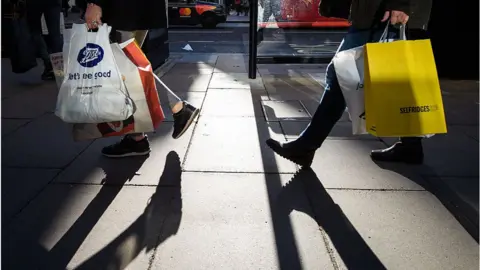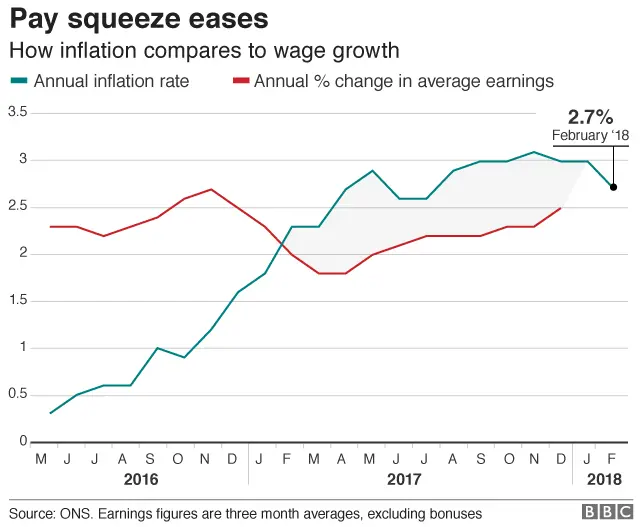Is the incomes squeeze coming to an end?
 Getty Images
Getty ImagesI have written plenty of articles about the most important challenge for the UK economy.
It's not Brexit.
It's not whether President Donald Trump launches a trade war.
These are substantial challenges, but they are not the most important issue when it comes to considering people's actual experience of the economy.
That comes down to the relationship between people's incomes and inflation - the rise in prices.
If inflation is above the rate of increase in wages, then people are suffering an incomes squeeze.
As the graph shows, this has been true since January last year.

Practically, it means that people are, on average, becoming poorer month by month as the cost of living increases.
This has been the situation for the majority of years since the financial crisis and is one of the most fundamental economic changes ushered in by that global calamity a decade ago.
Reversing it matters.
If consumers' incomes start rising in real terms then confidence is likely to increase and growth is likely to be given a boost.
Don't forget that consumer spending accounts for about 60% of UK economic activity.
Inflation spike
The inflation drop today suggests that the pay squeeze is easing.
Incomes data do lag prices, but if the trends continue (inflation easing and wages increasing) then it is likely that many millions of people will see their real incomes start rising again by the end of the year.
Which is much better news than we have had recently, particularly after the inflation spike which followed the Brexit referendum and the fall in the value of the pound.
That increased import prices of things like food and fuel, which pushed up costs here.
That does not mean Britain's incomes problem is over.
As the latest Resolution Foundation report, The Living Standards Outlook, revealed, the last decade has seen the most anaemic rates of wage growth for 200 years.
Before the financial crisis, average wage growth topped 4%.
Since 2009 it has been below 3%.
And benefits for those in work have also been cut.
Yes, there have been increases in things like the National Living Wage, but the government is well aware that, overall, the picture on incomes is pretty gloomy.
Movement
Mr Micawber was about right when he observed in Charles Dickens' David Copperfield: "Annual income twenty pounds, annual expenditure nineteen [pounds] nineteen [shillings] and six [pence], result happiness.
"Annual income twenty pounds, annual expenditure twenty pounds ought and six, result misery."
The moment when the former becomes more likely to be true rather than the latter moved a step closer today.
